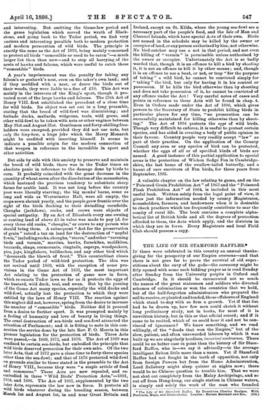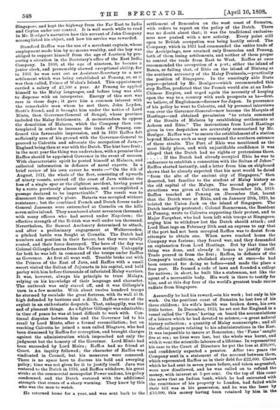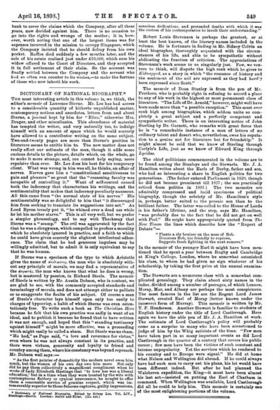THE LIFE OF SIR STAMFORD RAFFLES.'
Ir there were celebrated in this country an annual thanks- giving for the prosperity of our Empire overseas—and that there is not goes far to prove the survival of old super- stitions about the envy of the gods—the ceremony might be fitly opened with some such bidding prayer as is read Sunday after Sunday from the University pulpits in Oxford and In it should be enumerated not so much the names of the great statesmen and soldiers who directed schemes of colonisation or won the countries that we hold, but of the half-forgotten administrators who prepared the soil to receive, or planted and tended, those offshoots of England which stand to-day with so firm a growth. Yet if that list had to be drawn up, how few men could sketch it without long preliminary study, not in books, for most of it is unwritten history, but in this or that official record ; and if it came to be recited, which of us could hear it and not be con- vinced of ignorance ? We know something, and we read willingly, of the " deeds that won the Empire," but of the slow, patient, and often unrewarded labours by which it was built up we are singularly heedless, incuriosi nostrorum. There- could be no better case in point than the history of Sir Stam- ford Raffles, who is—we say it advisedly—to the average intelligent Briton little more than a name. Yet if Stamford Raffles had not fought in the teeth of opposition, not only from foreign Powers but from the Home Administration, Lord Salisbury might sleep quieter at nights now ; there would be no Chinese question to trouble him. That we were not shut out completely from the Malay Archipelago, and Bo cut off from Hong-kong, our single station in Chinese waters,. is simply and solely the work of the man who founded • The Life of Sir Stamford Raffles. By Demetrius Charles Boulger. With Portraits, Maps, and Illustrations. London: Horace Marshall and Son. Pls.)
Singapore, and kept the highway from the Far East to India and Ceylon under our control. It is well worth while to read in Mr. Boulger's narrative how this servant of John Company accomplished his object, and how his service was rewarded.
Stamford Raffles was the son of a merchant captain, whose employment made him by no means wealthy, and the boy was obliged to support himself from the age of fourteen by pro- curing a situation in the Secretary's office of the East India Company. In 1800, at the age of nineteen, he became a junior clerk, and presumably showed exceptional ability, for in 1805 he was sent out as Assistant-Secretary to a new settlement which was being established at Penang, or, as it was then called, Prince of Wales's Island. This appoiutment carried a salary of £1,500 a year. At Penang he applied himself to the Malay languages, and before long was able to dispense with an interpreter. Energy of this sort was rare in those days ; it gave him a common interest with the remarkable man whom he met there, John Leyden, Scott's friend, and it brought him under the notice of Lord Minto, then Governor-General of Bengal, whose province included the Malay Settlements. A memorandum to oppose the demolition of Malacca, which the Company then con- templated in order to increase the trade of Penang, con- firmed this favourable impression, and in 1810 Raffles felt sufficiently sure of his ground with the Governor-General to
proceed to Calcutta and advocate the occupation of Java,—
England being then at war with the Dutch. The hint bore fruit ; in the next year the thing was undertaken, with a promise that Raffles should be appointed Governor in the event of success.
With characteristic spirit be posted himself at Malacca, and collected information in defiance of naval experts. In a brief review of his own career he wrote :—" On the 4th of August, 1811, the whole of the fleet, consisting of upwards of ninety vessels, arrived off the coast of Java without the loss of a single spar or the slightest accident, having passed
by a route previously almost unknown, and accomplished a passage declared to be impracticable." The result was to disconcert the enemy's plans. Batavia was occupied without resistance ; but the combined French and Dutch forces under General Janssens were entrenched at Cornelis on the hills seven miles inland. They numbered about seventeen thousand, with many officers who had served under Napoleon ; the effective strength of the British was well under ten thousand. Nevertheless, Sir Samuel Auchmuty determined to attack, and after a preliminary engagement at Weltevreeden, a pitched battle was fought at Cornelis. The Dutch had numbers and position in their favour, but they were totally routed, and their force destroyed. The hero of the day was Colonel Gillespie famous from the Vellore mutiny. Unhappily for both he was left in command of the troops under Raffles as Governor. At first all went well. Trouble broke out with the Princes of the East of Java, and Raffles with a small escort visited the Sultan of Jojocarta in his capital, and held parley with him before thousands of infuriated Malay warriors. It was, however, always his principle to trust Malays, relying on his knowledge of their language and character. The outbreak was only staved off, and it was Gillespie's turn in a few months. With about twelve hundred troops he stormed by escalade the great fortress, with its wall 45 ft. high defended by bastions and a ditch. Raffles wrote of the exploit in an enthusiastic despatch. That, unhappily, was the end of pleasant things. As a fighter Gillespie was admirable; in time of peace he was at least difficult to work with. Con- tinual disputes between him and the Governor led to his recall by Lord Minto, after a formal reconciliation; but on reaching Calcutta he joined a man called Blagrave, who had been dismissed by Raffles for corruption, and brought charges against the administration which impeached not only the judgment but the honesty of the Governor. Lord Minto had been succeeded by Lord Moira ; Raffles had no friend at Court. An inquiry followed ; the character of Raffles was vindicated in Council, but his measures were censured. There is no space here to discuss his bold and sweeping policy; time was not given for it to justify itself. Java was restored to the Dutch in 1816, and Raffles withdrew, his great stroke at the commercial monopolist Power undone, his policy condemned, and the Dutch restored with the additional strength that comes of a sharp warning. They knew by this who was the man to watch.
Re returned home for a year, and was sent back to the settlement of Bencoolen on the west coast of Sumatra, with orders to report on the policy of the Dutch. There was no doubt about that; it was the traditional exclusive- ness now pushed with a new activity. Every point still open to British occupation was being hastily seized. The Company, which in 1811 had commanded the entire trade of the Archipelago, now retained only Bencoolen and Penang, both of them losing settlements, and neither of them proper to control the trade from East to West. Raffles at once recommended the occupation of a part; either the island of Banca, or failing that, of Rhio on the island of Bintang at the southern extremity of the Malay Peninsula,—practically the position of Singapore. In the amazingly able State paper—printed by Mr. Boulger—which recommended this step Raffles, predicted that the French would aim at an Indo- Chinese Empire, and urged again the necessity of keeping open the way to a country with such prospects as he—first, we believe, of Englishmen—foresaw for Japan. In pursuance of his policy he went to Calcutta, and by personal interviews won over the Governor-General—now become the Marquis of Hastings—and obtained permission "to retain command of the Straits of Malacca by establishing settlements at Acheen and Rhio." The instructions from Lord Hastings given in two despatches are accurately summarised by Mr. Boulger. Raffles was " to secure the establishment of a station beyond Malacca such as may command the southern entrance of these straits. The Port of Rhio was mentioned as the most likely place, and with unjustifiable confidence it was alleged that the Dutch had no rights or pretensions there.
If the Dutch had already occupied Rhio he was to endeavour to establish a connection with the Sultan of Johor." Raffles started instantly, and a letter from him on shipboard shows that he already expected that his next would be dated " from the site of the ancient city of Singapora," then deserted, but familiar to the student of Malay history as the old capital of • the Malays. The second paper of in- structions was given at Calcutta on December 5th, 1818. Raffles touched at Penang on ‘December 31st, learnt that the Dutch were at Rhio, and on January 29th, 1819, he hoisted the Union Jack on the island of Singapore. The Dutch instantly protested ; Colonel Bannerman, the Resident at Penang, wrote to Calcutta supporting their protest, and to Major Farquhar, who had been left with troops at Singapore, urging him to withdraw lest the Dutch should attack ; and Lord Hast ings on February 20th sent an express to say that if the port had not been occupied Raffles was to desist from attempts to obtain one. When news reached home the Company was furious ; they feared war, and they demanded an explanation from Lord Hastings. But by that time the thing was done, and already it began to justify itself. Trade poured in from the first ; Raffles, in defiance of the Company's traditions, abolished slavery at once—he had been censured for doing so before—and made the place a free port. He framed a code of laws and founded a college for natives; in short, he built like a statesman, not like the agent of a mercantile body. His work is there to testify for him, and at this day four of the world's greatest trade routes radiate from Singapore.
Assuredly he had his reward,—in his work ; but only in his work. On the pestilent coast of Sumatra he lost two of his three children; his wife's health was broken down, his own little better. In December, 1823, he set out for England in a vessel called the Fame,' having on board the accumulations of a leisure which he had devoted to science,—a great natural history collection ; a quantity of Malay manuscripts ; and all the official papers relating to his administrations in the East. It was impossible to insure at Bencoolen ; the 'Fame ' caught fire at sea ; no lives were lost, but the whole was burnt, and with it went the scientific labours of a lifetime. In representing his case to the Court of Directors he put the loss at £30,000, and confidently expected a pension. After two years the Company sent in a statement of the account between them, which represented Raffles as in their debt for 222,000. Claims which he had sent in seven years before, and taken as granted, were now disallowed, and he was called on to refund the money, with interest at 5 per cent. On the top of this came the news that an Indian bank, which he had entrusted with the remittance of his property to London, had failed while their bill was in his possession, and he was the loser by £16,000, this money having been retained by him in the
bank to cover the claims which the Company, after all these years, now decided against him. There is no occasion to go into the rights and wrongs of the matter ; it is, how- ever, worth noting that one of the largest items was for expenses incurred in the mission to occupy Singapore, which the Company insisted that he should defray from his own pocket. Raffles died suddenly a few months later, and the sale of his estate realised just under £10,000, which sum his widow offered to the Court of Directors, and they accepted it in full settlement of their claim. So the account was finally settled between the Company and the servant who bad so often run counter to its wishes,—to make the fortune of those who now inherit his work.




































 Previous page
Previous page